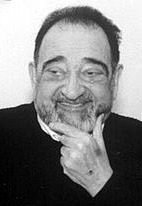
Carlos Sherman
Encyclopedia

Uruguay
Uruguay ,officially the Oriental Republic of Uruguay,sometimes the Eastern Republic of Uruguay; ) is a country in the southeastern part of South America. It is home to some 3.5 million people, of whom 1.8 million live in the capital Montevideo and its metropolitan area...
-born Belarusian–Spanish
Spanish language
Spanish , also known as Castilian , is a Romance language in the Ibero-Romance group that evolved from several languages and dialects in central-northern Iberia around the 9th century and gradually spread with the expansion of the Kingdom of Castile into central and southern Iberia during the...
translator, writer, human rights
Human rights
Human rights are "commonly understood as inalienable fundamental rights to which a person is inherently entitled simply because she or he is a human being." Human rights are thus conceived as universal and egalitarian . These rights may exist as natural rights or as legal rights, in both national...
activist and honorary vice-president of the Belarusian PEN Center
International PEN
PEN International , the worldwide association of writers, was founded in London in 1921 to promote friendship and intellectual co-operation among writers everywhere....
(a worldwide association of writers, aimed to promote intellectual cooperation and understanding among writers). He translated from Spanish into Belarusian and Russian
Russian language
Russian is a Slavic language used primarily in Russia, Belarus, Uzbekistan, Kazakhstan, Tajikistan and Kyrgyzstan. It is an unofficial but widely spoken language in Ukraine, Moldova, Latvia, Turkmenistan and Estonia and, to a lesser extent, the other countries that were once constituent republics...
.
Biography
Carlos was born in MontevideoMontevideo
Montevideo is the largest city, the capital, and the chief port of Uruguay. The settlement was established in 1726 by Bruno Mauricio de Zabala, as a strategic move amidst a Spanish-Portuguese dispute over the platine region, and as a counter to the Portuguese colony at Colonia del Sacramento...
, Uruguay. His father was from western Belarus
Belarus
Belarus , officially the Republic of Belarus, is a landlocked country in Eastern Europe, bordered clockwise by Russia to the northeast, Ukraine to the south, Poland to the west, and Lithuania and Latvia to the northwest. Its capital is Minsk; other major cities include Brest, Grodno , Gomel ,...
, and his mother was a Native American
Indigenous peoples of the Americas
The indigenous peoples of the Americas are the pre-Columbian inhabitants of North and South America, their descendants and other ethnic groups who are identified with those peoples. Indigenous peoples are known in Canada as Aboriginal peoples, and in the United States as Native Americans...
. He grew up in Argentina
Argentina
Argentina , officially the Argentine Republic , is the second largest country in South America by land area, after Brazil. It is constituted as a federation of 23 provinces and an autonomous city, Buenos Aires...
, and studied philology
Philology
Philology is the study of language in written historical sources; it is a combination of literary studies, history and linguistics.Classical philology is the philology of Greek and Classical Latin...
at Universidad de Morón
Universidad de Morón
The Universidad de Morón is a private university located in Morón, Buenos Aires, Argentina, founded in 1960.Ten faculties offer courses on Agronomy and Agro-alimentary Sciences; Architecture, Design, Art and Urbanism; Law, Political and Social Sciences; Exact, Chemical, and Material Sciences;...
in Buenos Aires
Buenos Aires
Buenos Aires is the capital and largest city of Argentina, and the second-largest metropolitan area in South America, after São Paulo. It is located on the western shore of the estuary of the Río de la Plata, on the southeastern coast of the South American continent...
from 1951 to 1956, and started his writing career there. He became a friend of Pablo Neruda
Pablo Neruda
Pablo Neruda was the pen name and, later, legal name of the Chilean poet, diplomat and politician Neftalí Ricardo Reyes Basoalto. He chose his pen name after Czech poet Jan Neruda....
. In 1955, he became editor in chief of the newspaper 'Mi Pueblo'. In 1956, influenced by Soviet propaganda, his father decided to return to Belarus (then the Belarusian Soviet Socialist Republic, part of the USSR), taking the whole family. At first, Carlos worked there in a factory, and then as a translator and librarian (chief of the publishing operations of the Jakub Kolas library of the Academy of Sciences of Belarus), and from 1980 onwards, devoting himself exclusively to literary work. He has translated into Spanish the work of several leading Belarusian prose writers and poets (such as Jakub Kolas Janka Kupala, Ryhor Baradulin, Vasil Bykau) and into Belarusian and Russian the works of García Lorca
Federico García Lorca
Federico del Sagrado Corazón de Jesús García Lorca was a Spanish poet, dramatist and theatre director. García Lorca achieved international recognition as an emblematic member of the Generation of '27. He is believed to be one of thousands who were summarily shot by anti-communist death squads...
, Neruda, and many others, while continuing to write his own poetry in Spanish. In the late 1980s, he launched a campaign to establish a Belarusian Centre of the International PEN organization, and, once it was established, served as its vice-president until 2002 or 2003, when he was forced to retire due to ill health.
He died in a hospital in Norway
Norway
Norway , officially the Kingdom of Norway, is a Nordic unitary constitutional monarchy whose territory comprises the western portion of the Scandinavian Peninsula, Jan Mayen, and the Arctic archipelago of Svalbard and Bouvet Island. Norway has a total area of and a population of about 4.9 million...
at the age of 71.

